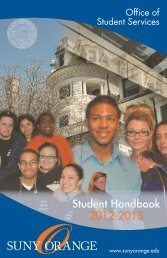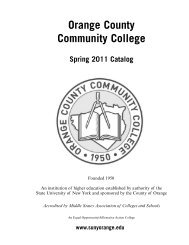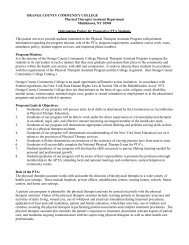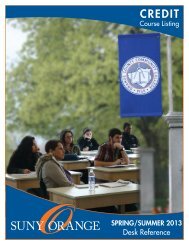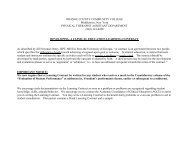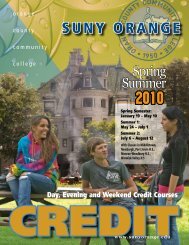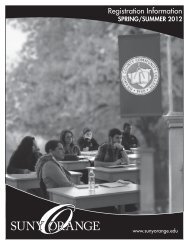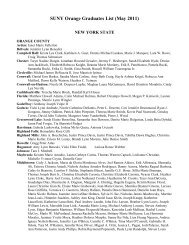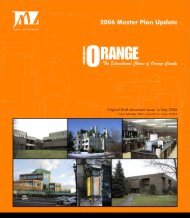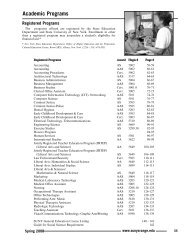You also want an ePaper? Increase the reach of your titles
YUMPU automatically turns print PDFs into web optimized ePapers that Google loves.
Political Science - Psychology<br />
PHY 106—General Physics 2 with Calculus<br />
3 lect., 3 lab., 4 cr. (Spring)<br />
A continuation of PHY 105. A calculus-based treatment<br />
of wave motion, electricity and magnetism, optics, relativity,<br />
quantum theory, atomic and nuclear physics. (GE 2)<br />
Prerequisite: PHY 105<br />
Corequisite: MAT 206<br />
PHY 108—Acoustics<br />
2 lect., 2 lab., 3 cr. (Spring)<br />
An introduction to the fundamentals of sound.<br />
Topics include: elementary principles of wave motion;<br />
analysis of musical sounds from varied sources<br />
including voices, instruments, oscillators, synthesizers,<br />
and recording media. Emphasis is placed on those<br />
factors which permit performer and listener to<br />
understand and control musical sounds. (GE 2)<br />
Prerequisite: MAT 101 or by permission of instructor<br />
PHY 111—Applied Physics 1<br />
2 lect., 2 lab., 3 cr. (Fall)<br />
An introduction to the fundamentals of mechanics, fluids,<br />
and heat. Topics include statics, kinematics, dynamics, energy,<br />
heat measurement gas laws, pressure, and hydraulics. (GE 2)<br />
Prerequisite: completed or concurrent enrollment in<br />
MAT 107 or higher is required<br />
PHY 112—Applied Physics 2<br />
2 lect., 2 lab., 3 cr. (Spring)<br />
Topics include an introduction to rotation, vibrations,<br />
harmonic motion, wave motion, electricity and<br />
magnetism, induced EMF, optics, quantum theory,<br />
atomic and nuclear physics. (GE 2)<br />
Prerequisite: PHY 111<br />
PHY 203—Physics for Science & Engineering 3<br />
3 lect., 3 lab., 4 cr. (Fall)<br />
Treatment of electro and magneto-statics, Gauss' Law,<br />
Faraday's Law, Ampere's Law; resistance inductance and<br />
capacitance applied to circuits. Transient and steady<br />
state analysis of RC, RL and RLC circuits. Resonance,<br />
electromechanical analogues; Maxwell's equations,<br />
electromagnetic waves and light; geometric and physical<br />
optics, gratings and spectra, polarization. (GE 2)<br />
Prerequisite: completed or concurrent enrollment in<br />
MAT 207; minimum grade of C- in PHY 104<br />
PHY 204—Modern Physics<br />
3 lect., 3 lab., 4 cr. (Spring)<br />
Study of the development of physics since 1900.<br />
Study of waves in light and matter. Includes comparison<br />
of Galileo's and Einstein's relativity, relativistic<br />
kinematics and dynamics; wave-particle duality, black<br />
body radiation and Planck's constant; introduction to<br />
quantum theory and wave mechanics; introduction to<br />
molecular and solid state physics; atomic structure and<br />
the periodic table; nuclear reactions and energy.<br />
Elementary particles and the Standard Model;<br />
applications to cosmology. (GE 2)<br />
Prerequisite: PHY 102 or PHY 106 or PHY 203<br />
Political Science<br />
(Global Studies Department)<br />
POL 101—Introduction to Political Science<br />
3 cr. (Fall/Spring)<br />
The course introduces basic concepts used by<br />
political scientists such as power, authority, the state,<br />
and analyzes major political ideologies of the<br />
contemporary world. General types of political<br />
systems and components of political systems are<br />
explained and compared. Major policy issues,<br />
especially those with global significance, are covered<br />
in connection with international politics. Fulfills<br />
category D. (GE 3)<br />
POL 102—U.S. Government—State and Local<br />
3 cr. (Fall/Spring)<br />
The changing role of state and local governments in<br />
America is examined. An emphasis is placed upon<br />
what state governments actually do, how they are<br />
structured, and the problems they face. Part of the<br />
course is devoted to the study of cities and<br />
metropolitan areas. Fulfills category A. (GE 3)<br />
POL 103—U.S. Government—National<br />
3 cr. (Fall/Spring)<br />
A survey of the U.S. political system at the national<br />
level including treatment of the historical background,<br />
central concepts and revisions of the constitutional<br />
framework, examination of the presidency, congress,<br />
federal bureaucracy, judicial structure and<br />
process,political parties, interest groups, the media, and<br />
current public issues. Fulfills category A. (GE 4)<br />
POL 221—International Relations<br />
3 cr. (Fall)<br />
A study of the principles used to describe the<br />
political relations among nations. Topics include the<br />
growth of nationalism, imperialism, decolonization,<br />
the balance of power concept, the role of<br />
international organizations such as the U.N. Fulfills<br />
category D. (GE 3)<br />
POL 220—Comparative Governments<br />
3 cr. (Spring)<br />
An introduction to political processes in nations<br />
other than the United States. The course uses the<br />
comparative method to analyze such topics as<br />
political culture, developed vs. developing nations, the<br />
organization of governments, political parties, and<br />
the operation of interest groups. Fulfills category D.<br />
(GE 3)<br />
Spring 2012<br />
www.sunyorange.edu<br />
227



